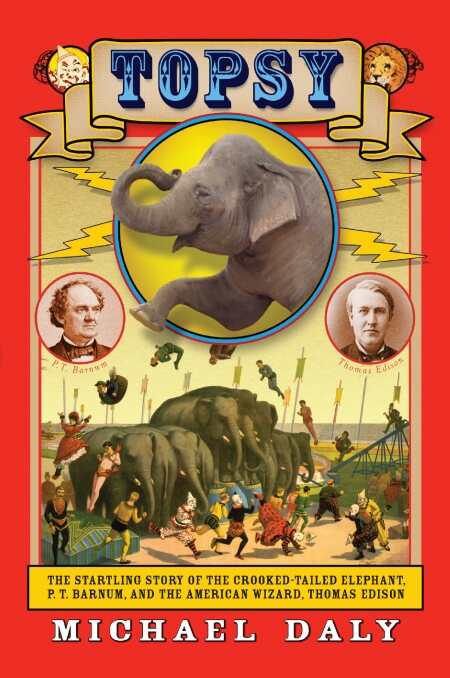
Topsy
The Startling Story of the Crooked Tail Elephant, P. T. Barnum, and the American Wizard, Thomas Edison
Stories of animal cruelty and electrical wizardry reveal the ruthlessness of history’s “great” men.
Topsy, a popular, gentle, intelligent, and sadly abused elephant takes center ring for a small part of this engaging narrative about the “Gilded Age.” More prominent are Michael Daly’s fascinating accounts of P. T. Barnum vs. Adam Forepaugh, the two leading circus hucksters of the time, and Thomas Edison vs. George Westinghouse, the two electrical wizards who illuminated the country. Brought to life are the seamy ideals of the age: “the white man’s burden,” survival of the fittest, and suckers born every minute. The ruthlessness of the men, the author convincingly shows, makes them no one’s heroes.
P. T. Barnum’s rags-to-riches life is vividly recounted as a progression of schemes that made him rich enough to go into the elephant business. Adam Forepaugh, who owned Topsy, ran a rough and tumble circus that appealed especially to rural audiences, who Forepaugh happily duped. When Forepaugh’s circus came to town, the police were bribed, pick pockets plied their trade through the crowds, and “Monday men” stole laundry off of clothes lines when people were at the shows. Daly’s anecdotes will have readers laughing at the bad luck of the sometimes honest circus goers.
The War of the Currents between Edison and Westinghouse is a complex tale with much at stake: bringing electricity to the country. Edison ultimately lost because of his stubborn support of direct current, which travels in only one direction for much shorter distances than Westinghouse’s alternating current. Daly engrossingly shows the inevitable progression of electricity from a novelty to its role in the criminal justice system: New York’s 1882 Electrical Execution Act that ended the use of hanging for capital punishment. Some readers will find the descriptions of electrocuting animals and condemned convicts disturbing.
Most, but not all elephant trainers, believed that brutality was the best teacher, and tormented and tortured these gentle beasts until they turned on their masters. One notable exception, who Daly sympathetically portrays, is Moses “Eph” Thompson, likely the best trainer of the era, who achieved great success though kindness. Thompson was African-American and therefore denied credit for his elephants’ acrobatics, with accolades wrongly given to Forepaugh’s imperious and inept son.
More tragic than these specific cruel acts was Barnum’s and Forepaugh’s understanding that good money was to be made from public executions of elephants. In 1903, Topsy was executed by poison, hanging, and, finally, a surge of 6600 volts of electricity provided courtesy of Edison’s company.
Daly skillfully recreates several examples of animal brutality, the importance of the circus as one of the few affordable forms of entertainment, and the immoral actions of the leading characters who would lie, cheat, and create mayhem if it would enhance their reputations and make them rich during an era when wealth was often regarded as the greatest good.
Reviewed by
Karl Helicher
Disclosure: This article is not an endorsement, but a review. The publisher of this book provided free copies of the book to have their book reviewed by a professional reviewer. No fee was paid by the publisher for this review. Foreword Reviews only recommends books that we love. Foreword Magazine, Inc. is disclosing this in accordance with the Federal Trade Commission’s 16 CFR, Part 255.
